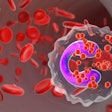
Understanding the genetic underpinnings of asthma may help clinicians distinguish between adult-onset asthma (AOA) and childhood-onset asthma (COA). The new study, “Integration of Functional Genomics and Statistical Fine-Mapping Systematically Characterizes Adult-Onset and Childhood-Onset Asthma Genetic Associations,” points to the aid of functional genomics and statistical fine mapping in making the distinction. The study was published in Genome Medicine.
Asthma has long been known to have a significant genetic component. Genome-wide association studies (GWAS) have identified numerous loci associated with asthma, but the causal variants and regulatory elements of these have remained largely unknown. This study bridges the gap by employing a combination of computational and experimental approaches to the equation.
Researchers performed heritability enrichment analysis to identify relevant cell types for AOA and COA. The study relied on fine mapping of putative causal variants at asthma loci and the integration of ATAC sequencing data from blood and lung cell types to annotate variants in candidate cis-regulatory elements (CREs). These CREs were computationally prioritized and experimentally assessed for enhancer activity in bronchial epithelial cells (BECs).
Researchers reported these key findings:
- Heritability enrichment analysis suggested a shared role of immune cells in both AOA and COA, with lung structural cells uniquely implicated in COA.
- Functional fine mapping uncovered 21 credible sets for AOA and 67 for COA, with only 16% overlap. One-third of loci contained multiple credible sets.
- CRE prioritization nominated 62 candidate CREs for AOA and 169 for COA. More than 60% showed open chromatin in multiple cell lineages, indicating pleiotropic effects.
- Effector genes included those involved in immune and inflammatory responses, such as TNFSF4, which is undergoing clinical trials as a drug target.
According to researchers, a comprehensive characterization of causal variants, regulatory elements and effector genes provides valuable insights into the genetic architecture of asthma and a refined understanding of the molecular mechanisms underlying different asthma subtypes. The findings could pave the way for personalized risk prediction and treatment strategies, aligning with the goals of precision medicine and improved clinical outcomes.






















